Wednesday, 22 March 2023 // From Poland to London
4:37 am, 79°
I can’t sleep. I should be able to because the setting is perfect. I’m 2 1/2 feet off the ground on the wonderful kia-kia. It is well-made and constructed. 10 feet wide by 14 feet long. Coconut palm frond roof is 100% waterproof, but it’s not raining. It’s cloudy and there are a few stars. My air mattress, cotton sleep sack, and cotton sack in which I have my clothes that doubles as a pillow, all that is needed for a good nights sleep.
My problem is not the cockerels crowing that started about 20 minutes ago. The problem is the incessant terrible music coming from the kava bar at least 100 yards away. It’s like having a terrible, inconsiderate neighbor. The pop music is insipid and repetitive, with a steady beat, it seems inspired by the worst of American Pop music. All at 4:30am.
I’ve heard other music here, pop music, I find appealing. Some I am shocked to find much like American Country-Western music, although the rhythm is a bit different, a little bit Pacific – whatever that may mean. Maybe a touch of reggae to it. Then there is this loud, incessant beat of some Techno Island, hip-hop. I hear that sitting in the backseat of the car, and by the guy wearing the MIT T-shirt, who has agreed to take Iao, his wife Tierebwebwe, and I into Poland, Iao having to repair the chain on his motorcycle. I am 100% certain the chain has never been lubricated, and the motorcycle rides through all kinds of water and sand.
I heard a song, so sweet yesterday I had to find it. I was speaking with Tabare when I heard it. I am told that Tabare is the richest on Kiritimati. I was told he ran the largest copra operation. The latter may be true, as I have seen what looks to be a well-organized organization. I see no evidence about the former. His compound uses the same manner of rude cooking, a fire of coconut husks built on the ground, iron or metal strapping over it, for pots to rest.
But that’s not the point. The point is I’m speaking to Tabare – about copra, about the broken motorcycle chain, about Poland and London – and I can’t help but hear a wonderful singing, more than 100 yards away, in the bush, amongst the coconut palms.
I ask him about it and he tells me it is toddy cutters at work. Toddy is a beverage made from the cutting of the coconut spathe, collecting the sap or resin that runs from it, and then fermenting it.
After my conversation with Tabare I walk off into the bush, trying to follow the sound of the singing. I spy a young man in the offing, wearing nothing but a pair of red shorts, carrying several bottles that are attached as if they are a string of fish he has caught. He is many yards away and I quickly turn on my camera to film him.
I stand motionless, as he walks through the palm forest toward me. His song is beautiful, melodic and plaintive. After he walks past, I run after him. Neither of a speak the other’s language. Yet I make clear my request. I play him several audio recordings I’ve made on my phone: the church singing in London, my own guitar playing back in Maine, the sound of a pig I have recorded in Tabwakea. He understands. He stands and sings his song for me.
His voice is wonderful. His singing is clear and effortless, swooping around and up to high notes and back down again. I have my eyes closed the entire time, nodding and swaying to his rhythm. When he finally finishes, we nod in approval.
I want to capture more, but he has humored me enough and leads me through the forest underneath another coworker, who is high in a coconut palm. They both laugh.
In the tree, amongst the crown, the young man whistles and sings. Then he climbs down, effortlessly, holding several bottles, again corded together. We would both like to interact further, but there are moths out there swarming us, and we are battling them away, as darkness starts to edge into the forest.
I walk out of the forest and back towards the copra station. Tabare is already out in the bush, walking to meet me, and hands me a coconut from which to drink. The coconut is so young, the entire shell is pliable. Instead of drinking from one of the three holes that can be cut out at one end, he has just cut out a half-dollar size hole in the middle of it. The water is fresh and clean and light, and about as wonderful a drink as can be. These are the kindnesses I receive. One notices something I like and then finds a way to repeat it. Tabare sent me off with an extra coconut just the day before. One for the road. Back at camp in Paris, Tierebwebwe has cooked up pumpkin with grated coconut, as she has heard from a Taona Rodney (wives take their husband’s first name as their last name), in London, I like pumpkin. They even went out of their way to find a pumpkin in Poland. Her version is radically different, but it tastes good and it’s the thought that counts.
Of course, I have acquired certain tastes over my lifetime. The breeze as I sleep, the pumpkin and coconut, the coconut water, the singing of the toddy maker. It does not comfort me when I can recognize certain chord progressions, or bass lines from the music of the kava bar blaring in the distiance. I cannot understand how locals tolerate the incessant sound. It would be trying enough to live over a nightclub in the inner city, but on a remote deserty island, I find it more than bewildering that the noise is ignored. But I’ve dictated enough into my phone now, and just maybe the music has stopped for the night.
It is 5:14 in the morning, the trade wind blows consistently from the east, roosters still call and respond. The sun is up in less than two hours. Maybe I can get some more sleep. But something tells me the village will be moving and up and about soon enough.
Note: at 6am I’m woken by the heavy clang of bells striking repeated sets of two, less than 50 yards from where I WAS asleep. I lie. They are not bells. They are to tall cylindrical metallic tanks that were used for some kind of fuel most likely. That’s what everybody uses for bells for their churches and schools around here. The damn kava bar is at it again. More roosters, children, talking, a motorcycle engine in the offing. Good morning from Poland.
I left Poland at 8:45. It’s now 9:34. The odometer reads 27.5 but I know it hasn’t been working correctly. I’m currently at the paved road! So that was all of 45 minutes from Poland to here. Very good to know. Off to Main Camp and then London. Just before I left Poland I saw somebody riding a brand new trike the rear part of it being a covered platform. They said something about it costing $4000AU. If $2000AU for my motorcycle is equal to $1400US, then what is $4K in US$? I ask, because I’m considering buying one for Iou to use, as he maintains Paris. He is supposed to have another worker along with him, whom I met the other day, but he speaks no English.
I was told yesterday the other worker is not out there as he has no transportation. Iou’s bike is six years old. It looks 60 years old because it is rusted and corroded, and as I witnessed his chain breaking yesterday, the bike really is a minute short of disaster.
I’ve also thought of a couple books I can buy to send to the primary school since they’re learning English. “Where the Wild Things Are,” Dr. Seuss’s “The Sleep Book,” “Curious George.”
“Wild Things” was my favorite, and of course there are palm trees and wonderful creatures that would engage the children. The “Sleep Book” has creatures having a cookout on a beach. And there is a mischievous monkey that will delight kids.
No doubt a few other books will come to mind. “Good night moon.” OK time to ride.
______________////|__________________////|____
<- Naked I-Matang Beach || Banana / Main Camp ->
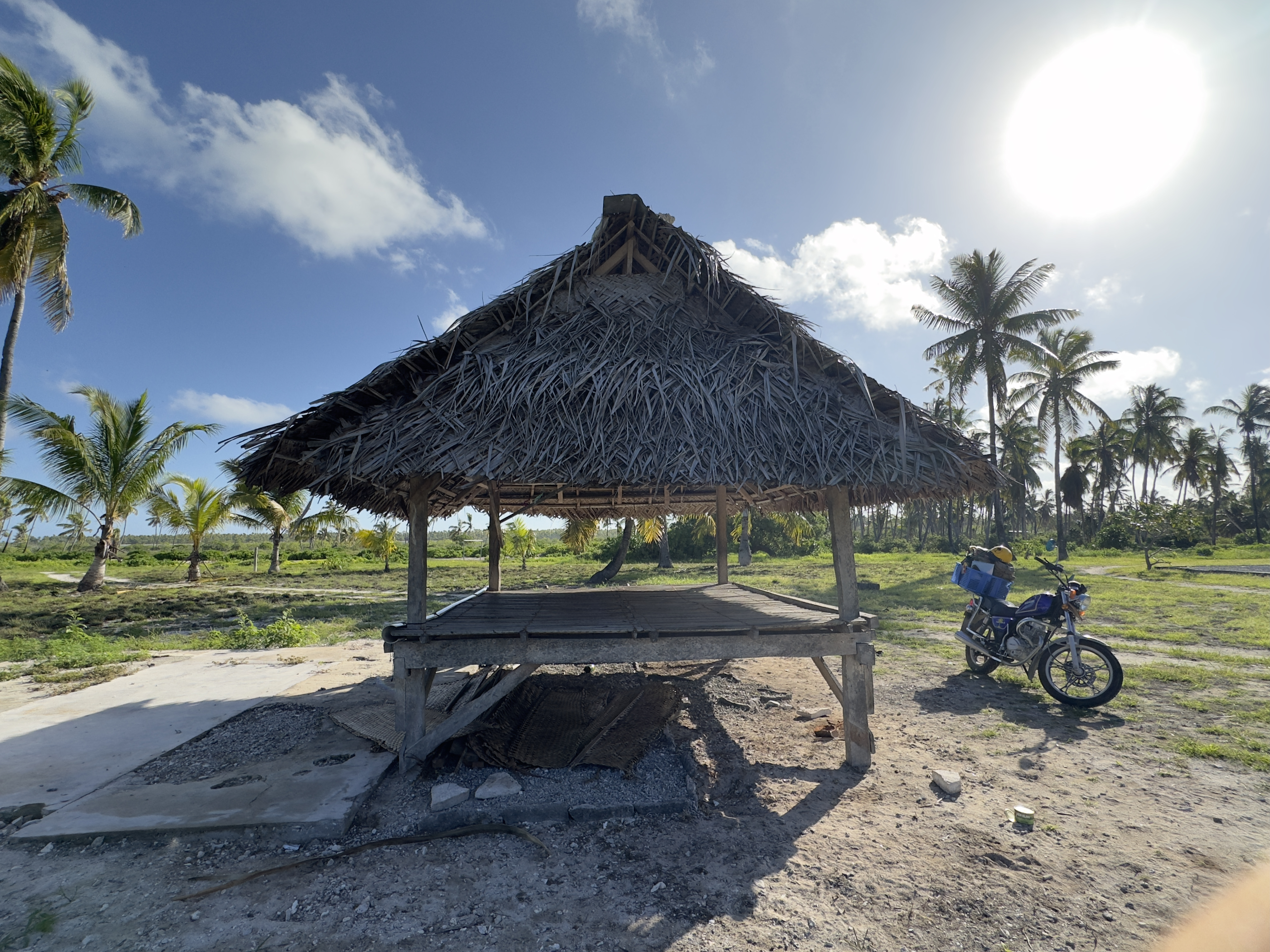

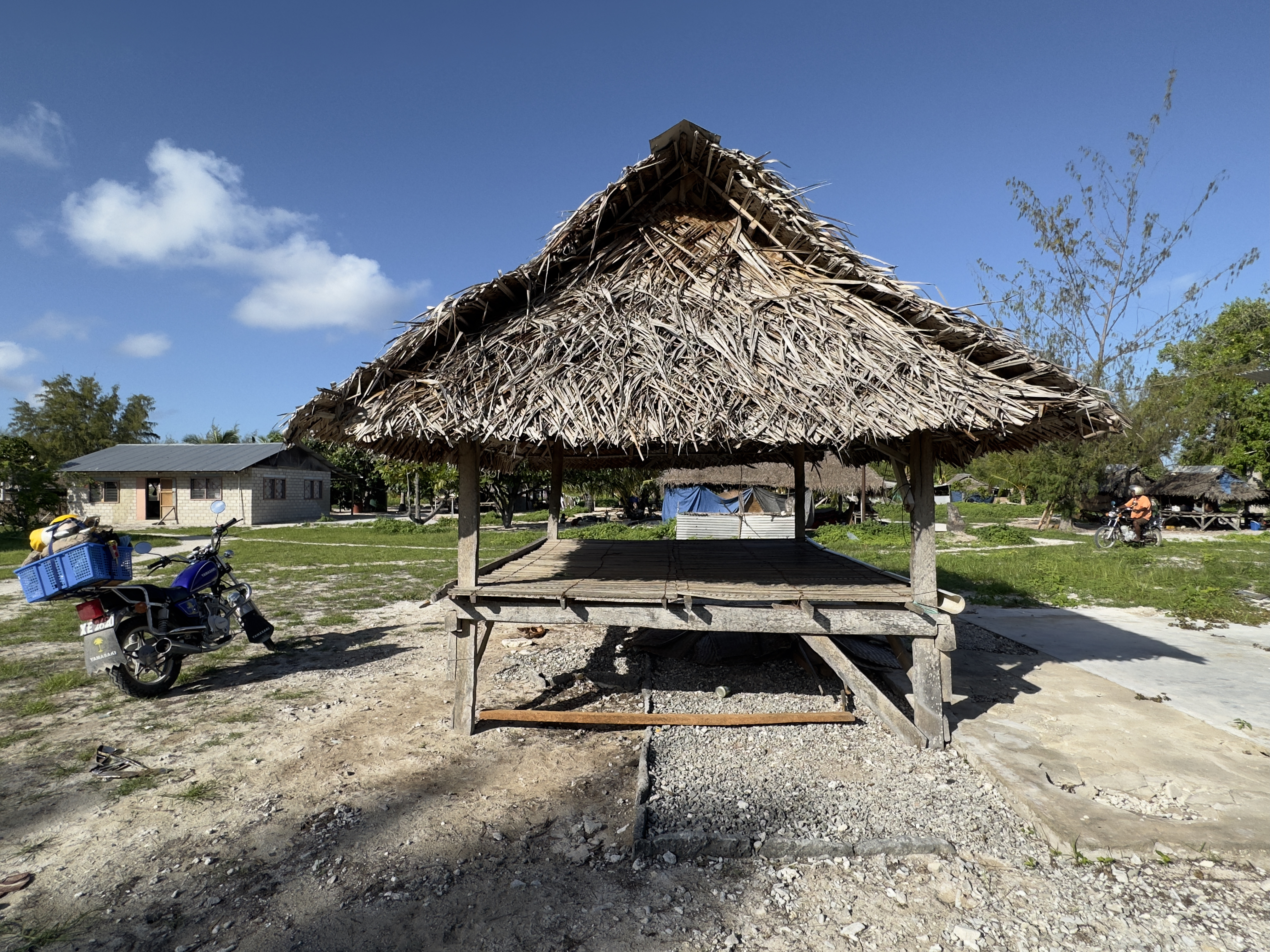

This kia-kia Poland is just to the west of the Catholic church, St. Stanislaus. Stanislaus was not only a saint, but the youngest brother of Father Emmanuel Rougier was Paul-Stanislas, who was known as Stanislas. Kia-kias can be on private property, or as seen here, part of a communal setting and used by anyone. Before I spent several nights on this kia-kia, on multiple occasions, I made sure it was alright with the locals. They were happy to have me. The views here: looking north, toward the lagoon; looking east, with the church behind; looking south; looking west - it’s the home just to the left of the corrugated tin, where one morning I witnessed a child being abused at dawn.
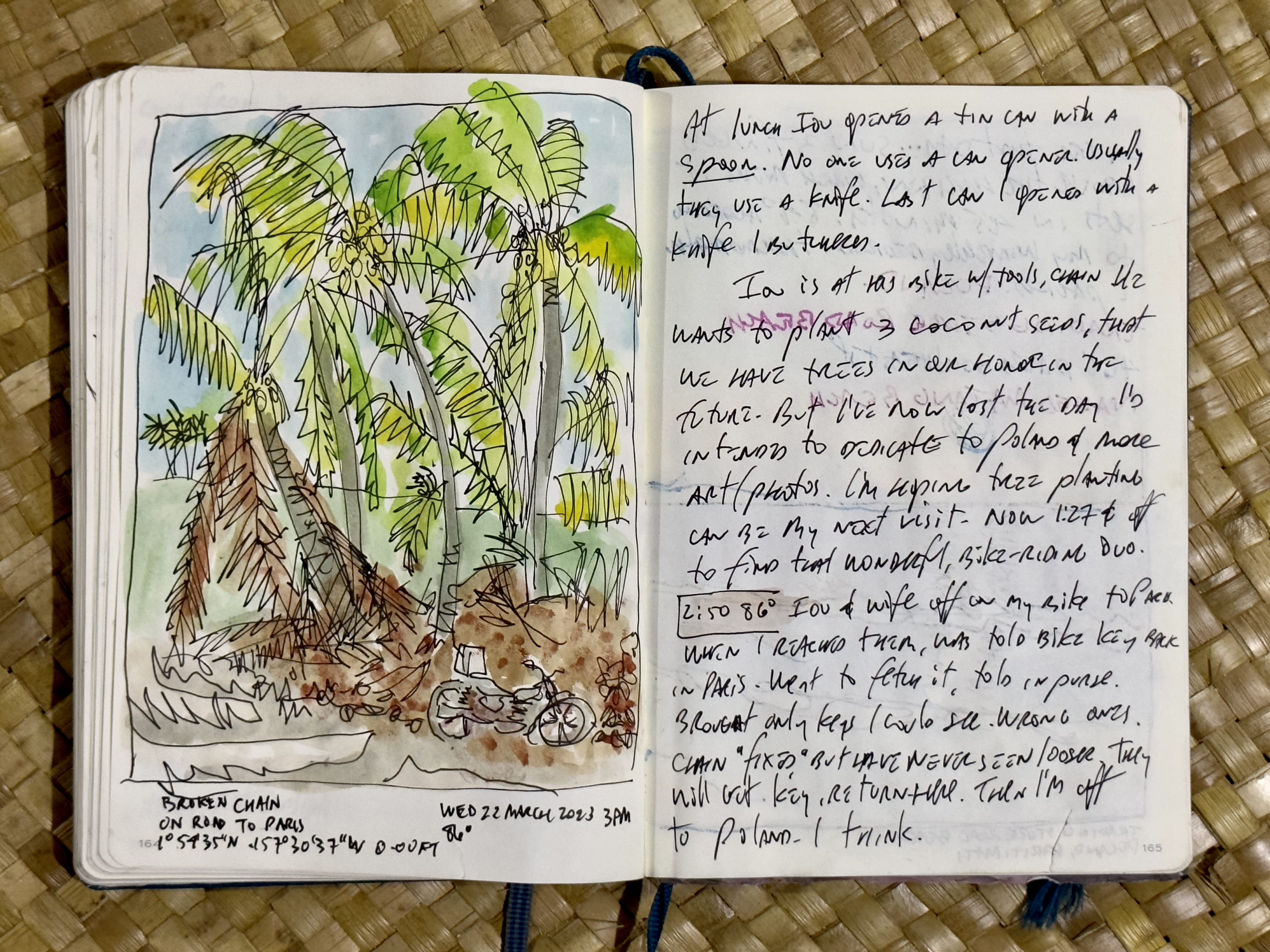
Broken Chain. Iou’s much rusted, never lubricated (except for water and salt water) chain breaks only minutes after I wonder if it will break. Takes 5+ hours to have him back on the road.
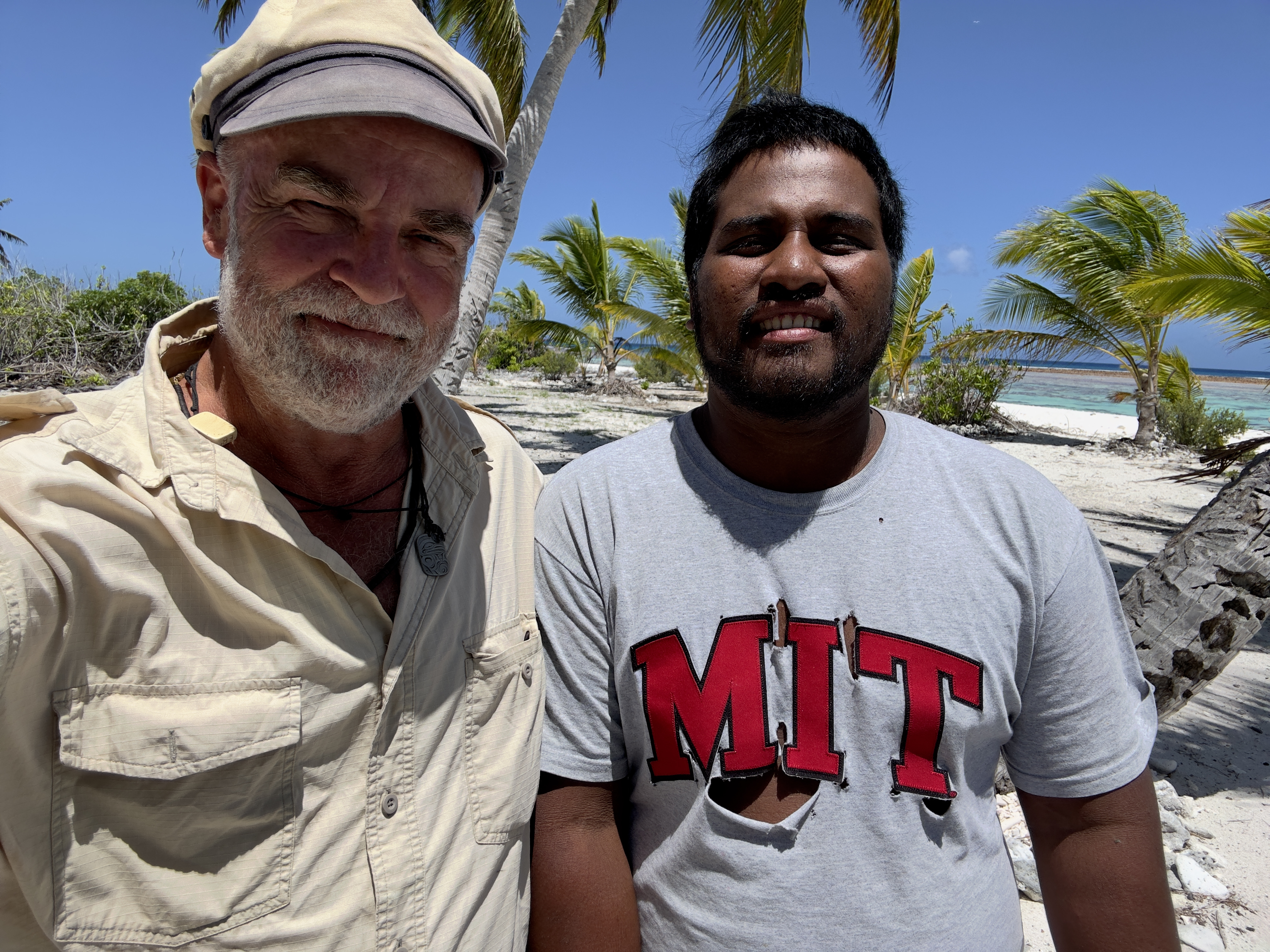
I took a drama class at MIT when I was fifteen, as a high school sophomore. Later played softball for the MIT Film Department for 14 years, from age 23 — 37, till I moved to Texas. This kind gent offered us a much-needed lift from the bush at Benson Point/Paris, to the village of Poland, after the Iou’s motorcycle chain broke.
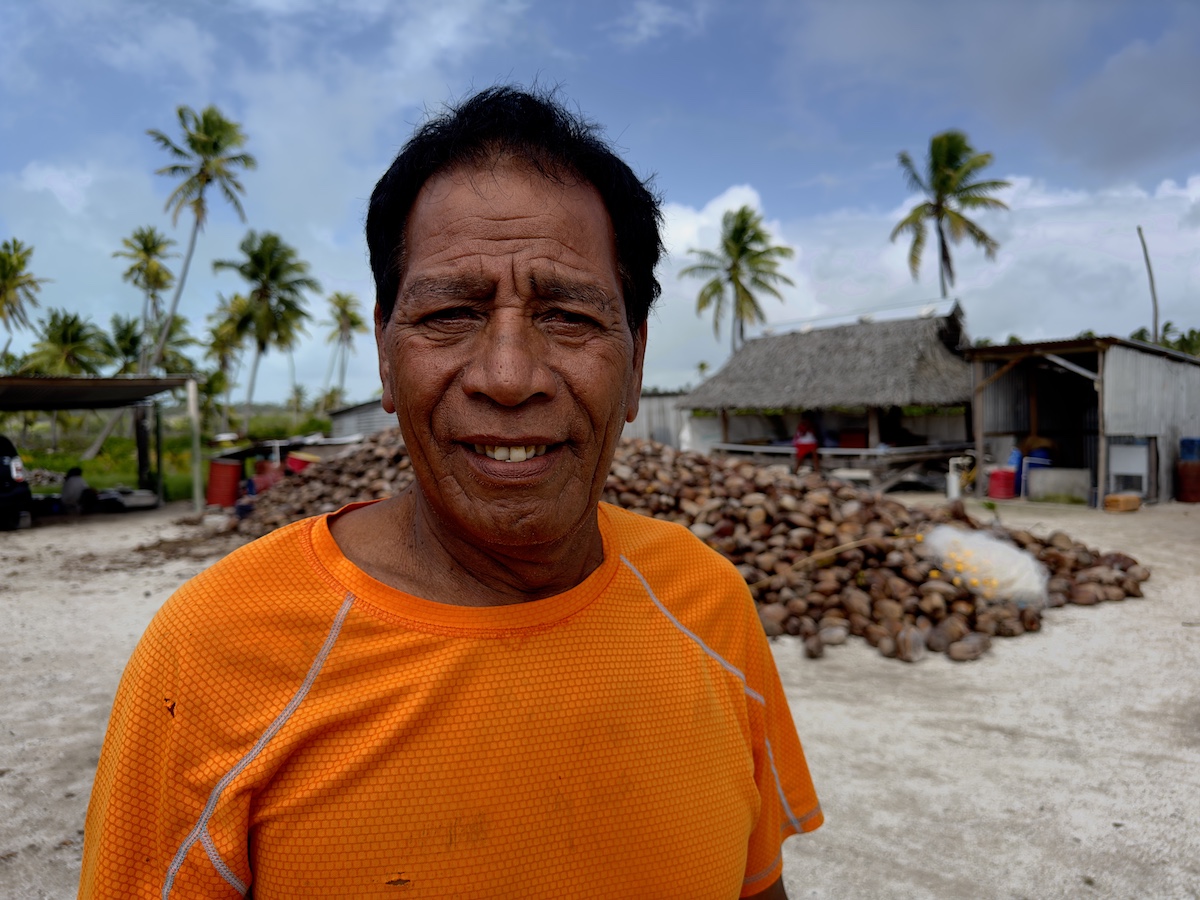
Tabare Takeakea, councilman for Poland, and owner of the trading store, and copra operation opposite it. This is the only store on the island that IS a trading store. Yes, they accept cash, but will also accept payment in bags of copra. Much of the population is living via local subsistence — fish and whatever scant crops they can grow — and often on the government dole, due to lack of jobs. Which means the population — often regardless of having a full-time job — turns to copra as income, the products that has been the island’s economic foundation for generations.
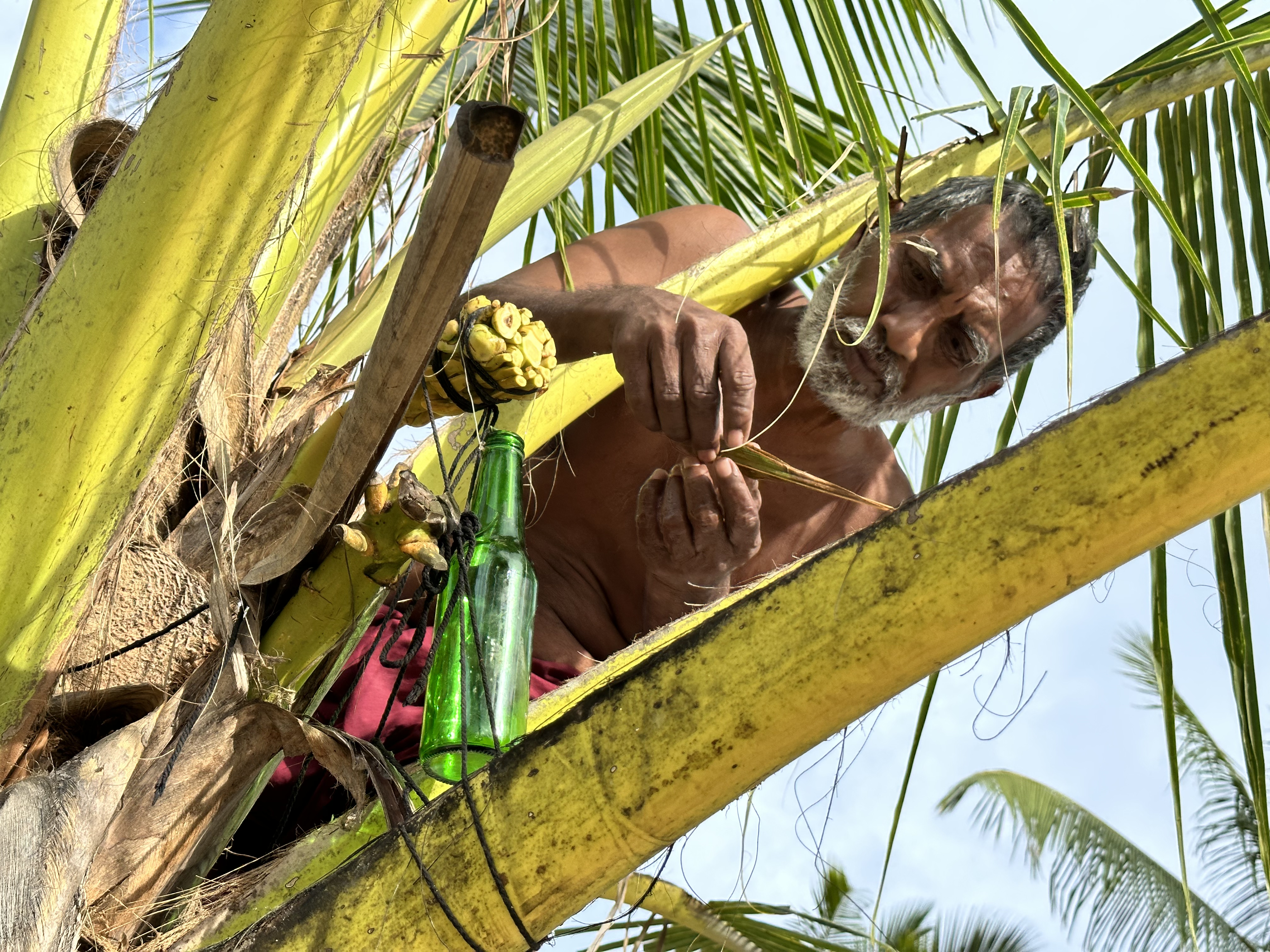
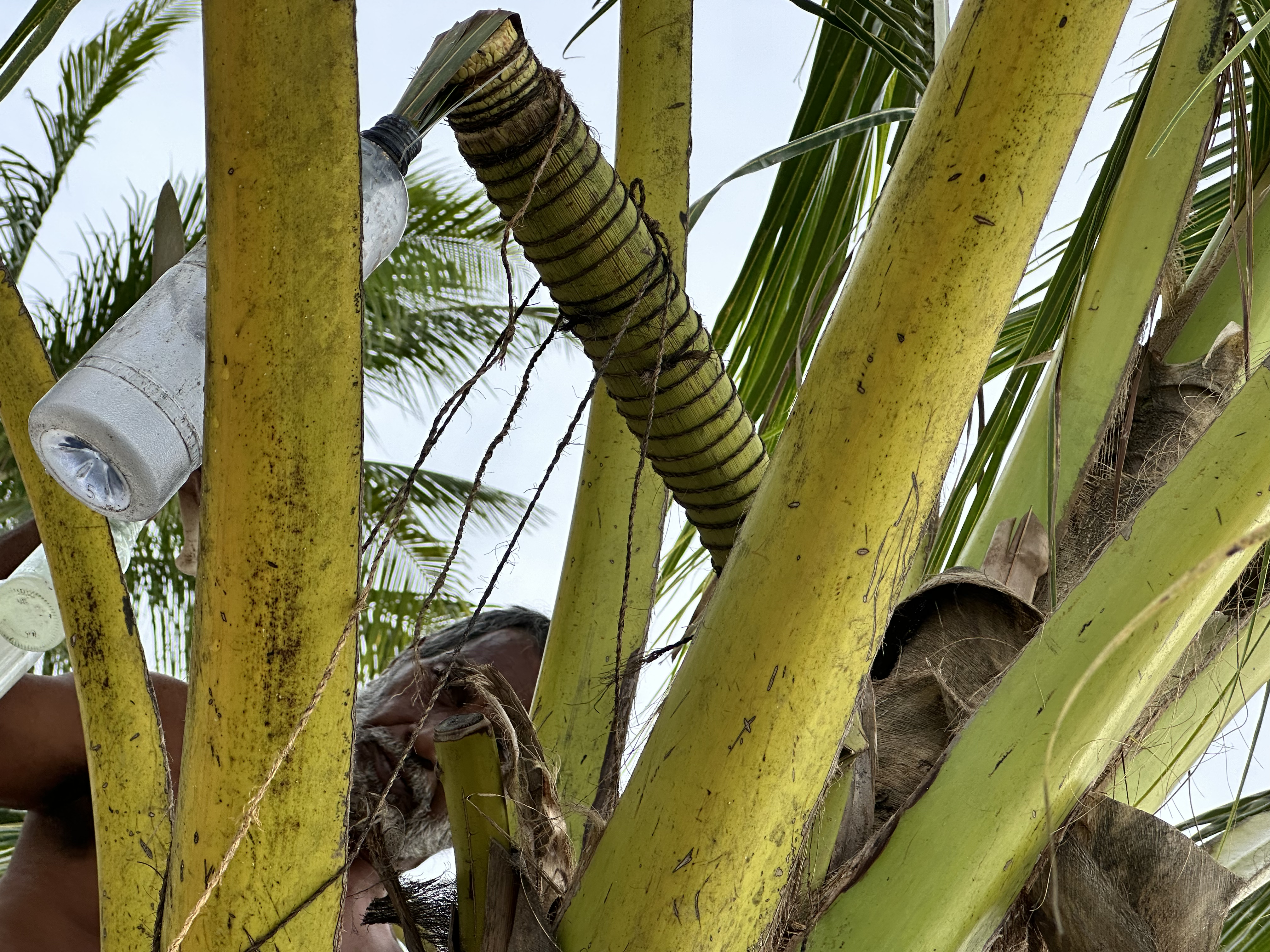
A toddy cutter in Tabwakea, working the trees in his yard. He starts by cutting the palm frond at the spathe — the point where the leaf stalk begins to spread to flower and then fruit — and fastening the tip of a frond to butt against the truncated spathe, that the sap then runs down the pointed leaf into a hanging bottle.
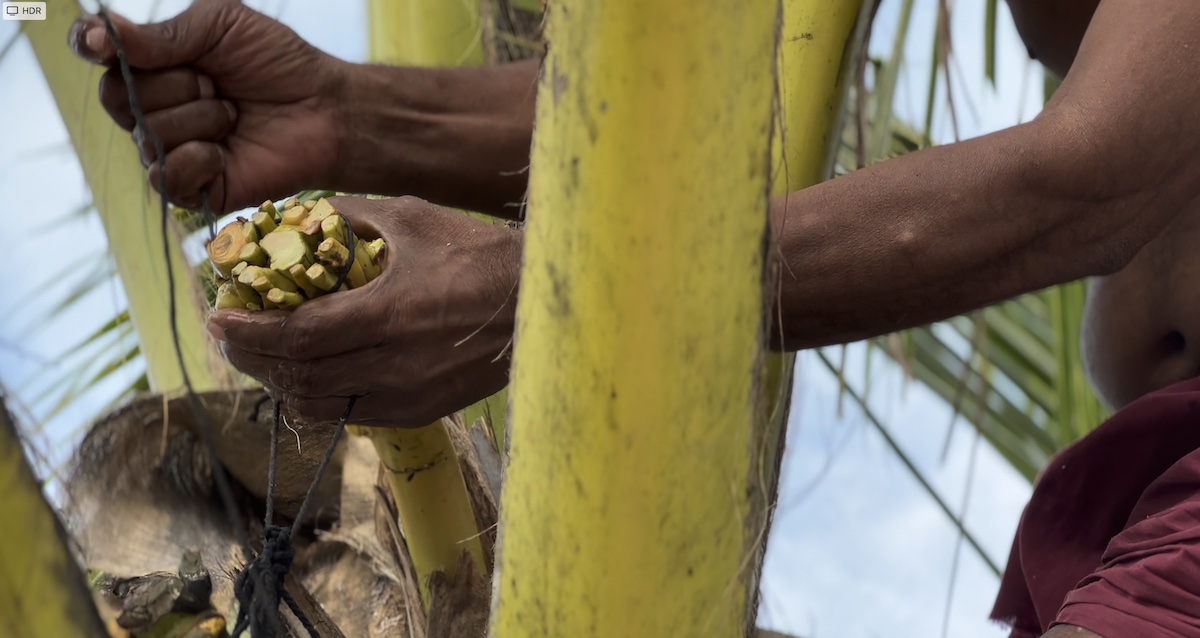
[video] At end of day, a barefoot toddy cutter sings, his bottles of coconut sap rattling, as he walks on through the remains of the plantation between Poland and the lagoon. The song of a toddy cutter is individual. I’m told they sing due to a tradition alerting area women that men are in the trees, above, that they not be frightened, imagining them being spied on while bathing. This song is of a son missing his deceased mother, wishing he could see her, hold her one more time. It seems everyone on this island has a great singing voice. The fermented sap is known as 'toddy' or palm wine, and is a mild intoxicant. Best consumed within a day or so of tapping the tree via cuttings at the coconut frond’s spathe, at the top of the tree, the toddy will turn to vinegar. Heated and stirred on end, the sap will begin to caramelize, and become a sweet syrup, known as Kamwaimwai.
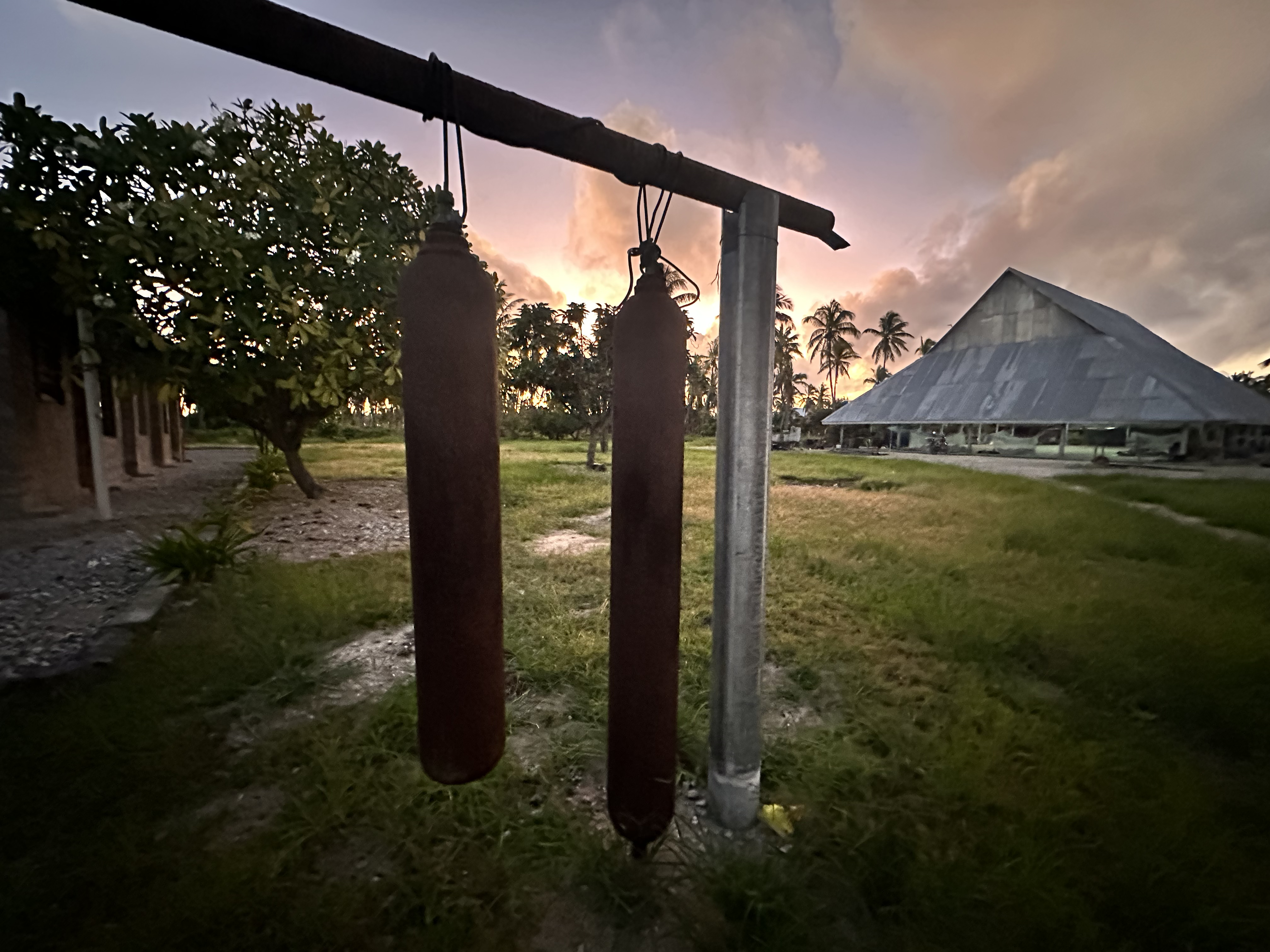
These 'bells' are in London, at the KUC, not to be confused with KFC. Kiribati United Church, is a protestant denomination. Regardless of your beliefs, you’ll still wake up at the crack of dawn, as a guy who’s part of the church starts whacking these empty gas canisters with a length of pipe or a wrench. Where there is a church on the island, you’ll find 'bells,' hung by a length of rope or jury-rigged chain or wire.
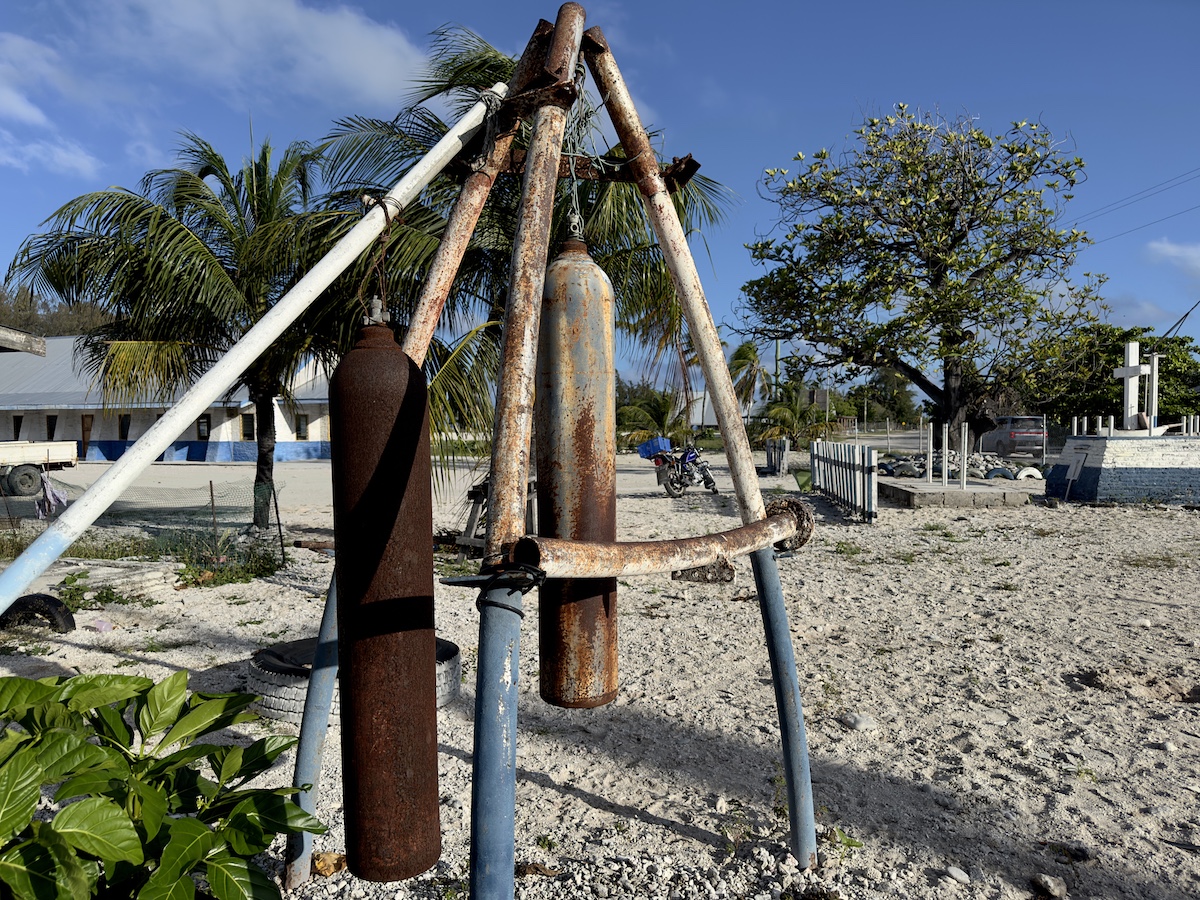
Here in Poland, just before sunrise, someone has just woken all within hearing, whacking out the heavy clang of a two-tone rhythm on the bells of St. Stanislas church, seen at left. On the horizon, the mwaneaba associated with the Catholic Church, where one fill find people hanging out, not only on a daily basis, but often having set up home along the interior perimeter, where people gather to play cards, weave coconut frond mats, nap, cook, watch each other’s kids, or get together to watch a film on a TV that’s been set up for the occasion.
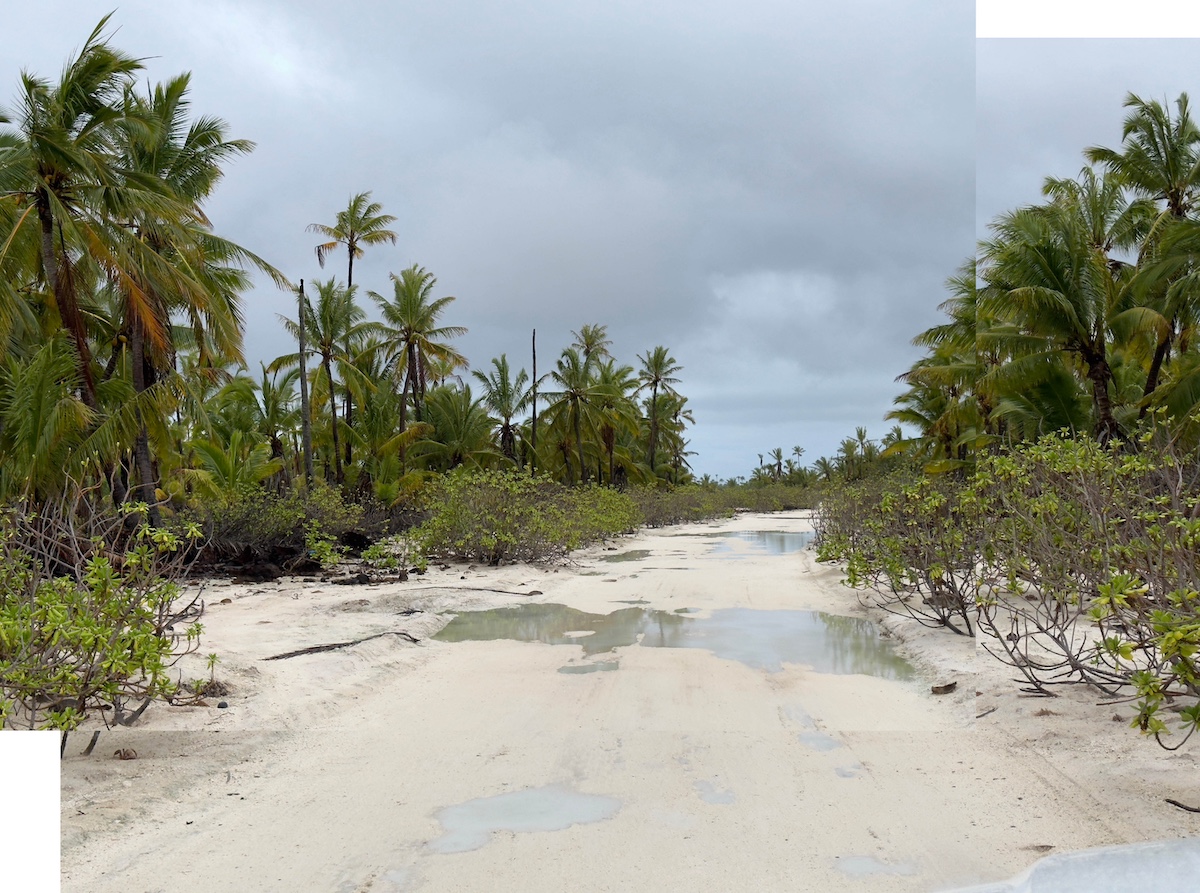
It’s sixteen miles of sand, mud, water, taking Carver Road east from Poland to the only paved road on the island, 1A. Carver was named for the US officer who bulldozed a route in the 1940s, over the existing Ford Model-T route, carved by Fr. Rougier and his crew. It’s more 'pleasant' to motorbike on the unpaved road, as the asphalt road, 1A, had it’s bitumen — viscous petroleum - poured circa 1957, when the British were using the island in their atomic weapons testing program. The 1A road has deteriorated considerably in the decades that have followed.